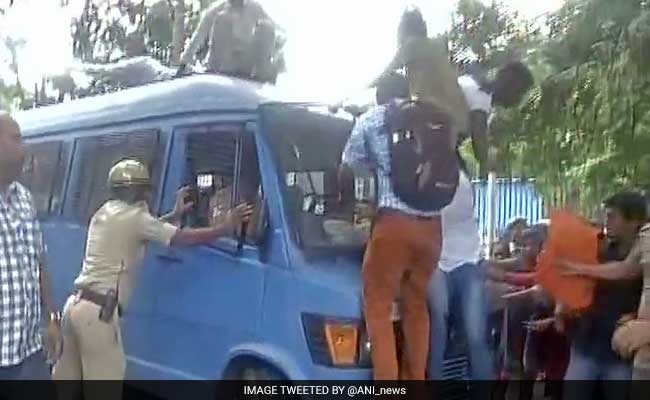Kashmir debate was organised by Amnesty India at United Theological College in Bengaluru.
Bengaluru:
Amnesty International's India chapter has said it has not yet received a copy of a FIR or First Information Report in a sedition case filed against it in Bengaluru, but has questioned why "organising an event to defend constitutional values is now being branded 'anti-India' and criminalized."
The Karnataka Police had filed the case on Monday after anti-India slogans were allegedly raised during a debate on Kashmir organised by the human rights-focused NGO in Bengaluru on Saturday.
The debate had turned chaotic after some people from Kashmir -- most of them students -- exchanged heated words with Kashmiri Pandit leader and former journalist RK Mattoo when he said, "The Army is present everywhere in the North-East, Kashmir and other sundry places. I can tell you proudly that the Indian Army is one of the most disciplined armies in the world."
"Pro-freedom" Kashmiris at the debate shouted slogans and policemen posted for the event eventually managed to pacify the two groups.
On Sunday, activists of the ABVP, a students' body affiliated to the BJP's ideological mentor the RSS, staged a protest against the event, calling it "anti-national" and filed a complaint with the police, also submitting a video recording. ABVP activists staged protests in the city today too.
 Karnataka Home Minister G Parameshwara of the Congress said the "intention and background" of those involved would be investigated.
Karnataka Home Minister G Parameshwara of the Congress said the "intention and background" of those involved would be investigated.
Amnesty India said it had organised the event as part of a campaign to seek justice for "victims of human rights violations" in Jammu and Kashmir.
"The police were invited and present at the event. The filing of a complaint against us now, and the registration of a case of sedition, shows a lack of belief in fundamental rights and freedoms in India," it said in a statement.
Amnesty also said that "towards the end of the event, some of those who attended raised slogans, some of which referred to calls for 'Azaadi' (freedom)," adding that as a matter of policy, it does not take any position in favour or against demands for self-determination.
It however said that "it considers the right to freedom of expression under international human rights law protects the right to peacefully advocate political solutions that do not involve incitement to discrimination, hostility or violence."
A debate on the ambit of the sedition law had disrupted Parliament earlier this year after Kanhaiya Kumar, a student leader at Delhi's Jawaharlal Nehru University (JNU), and others were arrested from campus for sedition.
To opposition demands in Rajya Sabha that the "relic" law be scrapped, union Home Minister Rajnath Singh had said that an all-party meet would be scheduled to discuss the matter after the Law Commission submitted a report.
The Karnataka Police had filed the case on Monday after anti-India slogans were allegedly raised during a debate on Kashmir organised by the human rights-focused NGO in Bengaluru on Saturday.
The debate had turned chaotic after some people from Kashmir -- most of them students -- exchanged heated words with Kashmiri Pandit leader and former journalist RK Mattoo when he said, "The Army is present everywhere in the North-East, Kashmir and other sundry places. I can tell you proudly that the Indian Army is one of the most disciplined armies in the world."
"Pro-freedom" Kashmiris at the debate shouted slogans and policemen posted for the event eventually managed to pacify the two groups.
On Sunday, activists of the ABVP, a students' body affiliated to the BJP's ideological mentor the RSS, staged a protest against the event, calling it "anti-national" and filed a complaint with the police, also submitting a video recording. ABVP activists staged protests in the city today too.

ABVP workers protest against Amnesty event in Bengaluru
Amnesty India said it had organised the event as part of a campaign to seek justice for "victims of human rights violations" in Jammu and Kashmir.
"The police were invited and present at the event. The filing of a complaint against us now, and the registration of a case of sedition, shows a lack of belief in fundamental rights and freedoms in India," it said in a statement.
Amnesty also said that "towards the end of the event, some of those who attended raised slogans, some of which referred to calls for 'Azaadi' (freedom)," adding that as a matter of policy, it does not take any position in favour or against demands for self-determination.
It however said that "it considers the right to freedom of expression under international human rights law protects the right to peacefully advocate political solutions that do not involve incitement to discrimination, hostility or violence."
A debate on the ambit of the sedition law had disrupted Parliament earlier this year after Kanhaiya Kumar, a student leader at Delhi's Jawaharlal Nehru University (JNU), and others were arrested from campus for sedition.
To opposition demands in Rajya Sabha that the "relic" law be scrapped, union Home Minister Rajnath Singh had said that an all-party meet would be scheduled to discuss the matter after the Law Commission submitted a report.
Track Latest News Live on NDTV.com and get news updates from India and around the world

